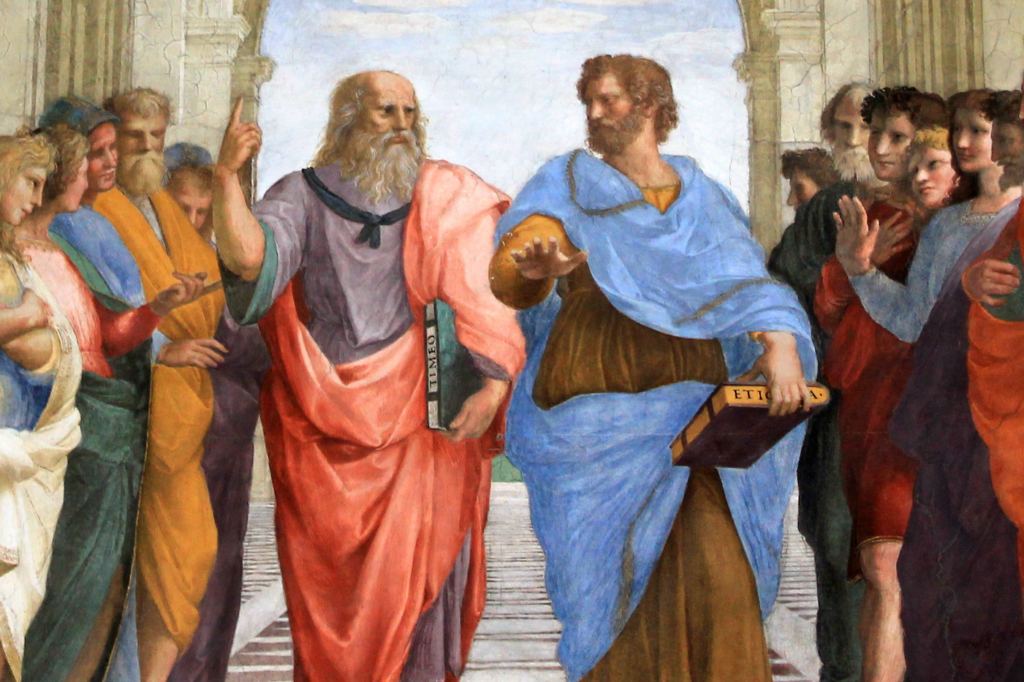Should the term homo sapiens (wise man) be binned in favor of homo disputans (disputing man)? In Why Argument Matters, cultural critic and writer Lee Siegel does not say so directly, but he does contend that argument is a defining quality of humanity. We are born to argue with others and with ourselves, and we register our very existence through the drive and the capacity to do so. “Argument goes so far back,” Siegel argues, “because argument is . . , an ontological necessity.” This powerful claim is matched by an equally powerful claim about the social power of argument. At its best, this kind of argument is “a categorical challenge to the status quo, that seeks to modify, amplify, or replace one set of givens with another.” Argument is built into the fabric of every person and every society.
Describing argument as an “ontological necessity” may sound rather mystical, especially to those who tend to think about argument as a rhetorical or philosophical skill. Considering the book’s title and the sorry state of public argument in our social media age, readers might well expect the book to propose correctives and offer some “how-to” advice.
Siegel does think we can argue better, but he is more focused on showing how deeply argument penetrates our humanity. He writes:
Bound up with the urgency of living, argument is as much an autobiographical process as it is an intellectual construction and a rhetorical art. Because our very life is an ongoing argument about the value of our life, the way we argue tells a story about who we are.
Start your day with Public Discourse
Sign up and get our daily essays sent straight to your inbox.
The modern story of arguing might seem troubling to many. Debate too often seems emotion-driven, and laden with fallacies and quarrelsome noise. By exploring the significance of argument for both individuals and society, Siegel reminds us why to be human is to argue—and why that is something to celebrate.
Argument and Emotion
One important theme in Siegel’s book is the ways arguments are linked to our emotions. Today, many of us are worried about our society’s ability to have reasonable debate. Indeed, many books have been written about the ways biases and unreason have prevailed: Steven Pinker’s Rationality: What It Is, Why It Seems Scarce, Why It Matters (2021), Jonathan Rauch’s The Constitution of Knowledge (2020), and Douglass Murray’s The Madness of Crowds (2019), to name just three. Jonathan Haidt has provided a powerful metaphor of the elephant and the rider to capture this concern: the rider (conscious, reasoning human) sits atop the enormous elephant (the emotions, biases, presuppositions, false pattern-making, and stuff of the lizard brain). The rider deceives himself that he controls this powerful beast.
We do live in an age that seems to have surrendered to all sorts of emotionalism. Emotions play far too large a role in the factionalism and impasses that bedevil civic life in the media age. This emphasis on mankind’s irrational propensities amounts to a counsel of defeat. But in fact, Siegel notes that we need not be slaves to the non-rational. Elephants can be and have been tamed and trained, and they don’t just take their riders wherever they, the elephants, capriciously decide. Our reasoning faculty is not as impervious to improvement as frequently reported. In fact, Siegel argues, to reason well transcends rationality and shapes our moral lives as well. Logos and ethos are not separate faculties, but are intertwined. Argument well practiced, in other words, can be soul-hygienic.
Successful argument, then, depends on conscious effort. This brings us to the book’s more practical passages. Siegel reminds us that John Locke first elaborated on the various “ads” frequently used to construct specious arguments: ad hominem, ad verecundiam, ad ignorantiam. Locke was suspicious of rhetoric because he saw it as a set of devices for eloquence and, by extension, verbal trickery. For Locke, rhetoric is “a powerful instrument of error and deceit,” and the mastery of it is the study of “perfect cheats.” In his efforts to yoke argument to truth, Locke kick-started our now voluminous glossary of fallacies (the “ads”).
Our reasoning faculty is not as impervious to improvement as frequently reported. In fact, Siegel argues, to reason well transcends rationality and shapes our moral lives as well.
Democratic Beginnings
Locke’s guidance for rationally grounded argument is the foundation for his political philosophy. For Locke, self-evident rights are accessible to those who properly deploy their reason. Locke’s self-evident truths serve as key pillars of America’s democratic republic. Siegel notes that Locke “saw [democracy] as a political system that built consensus on the solid foundations of shared facts and a general agreement about the possibilities the facts could or could not support.”
This is one of the very few passages in which Siegel links argumentation directly with democracy. The relationship between argument and democracy, however, did not begin with the American founding but with the ancient Greeks: there is an unmistakable tie between the agora (the birthplace of Greek democracy), and the development of rhetoric as a field of study.
Debates about the meaning of argumentation have existed from that Hellenic beginning. The modern debate-team practice of arguing for various sides of an issue (know your own position, know the position of those with whom you disagree) was already being practiced by the sophists and then by later Greek rhetoricians. Was this practice an exercise in shiftiness, as the sophists’ critics charged, or was it a mind-broadening exercise in understanding the full dimensions of the issue at hand—maybe even a form of empathy?
In one of the book’s most high-minded passages, Siegel avers that “argument is an ultimate form of caring,” while likewise describing the best argument as one that “has to be not just the sharpest rebuttal of an opponent’s position. It has to be the fullest understanding of an opponent’s position.”
The relationship between argument and democracy, however, did not begin with the American founding but with the ancient Greeks: there is an unmistakable tie between the agora (the birthplace of Greek democracy), and the development of rhetoric as a field of study.
Quarreling and Modern Media
Another key question Siegel considers is: have digital media rendered the high level of argument that the ancients enjoyed obsolete? Such deep understanding is impossible to encompass in 280 characters. Furthermore, algorithms work at keeping users—and that’s pretty much all of us—inside their individualized social and political comfort zones, which means they rarely encounter serious versions of their opponents’ views. The modern media environment discourages even attempting to understand one’s opponents. “Your absolute certainty that you are right blots out the existence of the other person,” Siegel writes. “In terms of argument, the internet is one of the grossest errors of our time.”
In discussing the verbal blood sport that marches under the banner of debate, Siegel offers a helpful distinction: this antagonistic outpouring shouldn’t even be called an argument. Instead it is quarreling, which he defines as “a disagreement inflamed by ego.”
Given our propensity for quarreling, modern Westerners would benefit from learning about other, non-Western traditions of debate. In one of the most enjoyable sections, he introduces a few Hindu concepts, the most striking of which is “Vada.” Vada, he explains, is “an animated conversation between two parties who are not committed to making their point of view prevail.” Respect for one’s opponent and straightforwardness about one’s goals are starting-point necessities. Perhaps one should imagine something like a Socratic dialogue without Plato’s constant rigging in favor of Socrates—a conversation rather than a contest. Vada applies to less philosophical, more homely instances as well. For example, perhaps Vada could guide school board meetings in disputes over curriculum.
Argument vs. Persuasion
Vada points to the crucial contrast between argument and persuasion: the end of argument is truth, while the end of persuasion is assent. Like Vada, argument is less about winning or prevailing and more about common discernment of truth. In other words, argument is more philosophical, while persuasion seeks to get its own way and thus opens itself up, à la Locke’s conception of rhetoric, to the use of cheats and deceits. Persuasion puts a Vince Lombardi poster on its wall: “winning was the only thing.”
But this neat distinction might not be so simple; or, at the very least, it wouldn’t be right to simply conclude that argument is good and persuasion is bad. Aristotle’s Rhetoric provides a more complicated account of persuasion. As a younger man, Aristotle had adopted the anti-rhetoric stance of his teacher Plato, sharing his suspicion of sophistic education. He later came to see rhetoric as a sort of adjunct to philosophy. Rhetoric might help with discovering the truth, and it could definitely help to propagate it. In possibly the most famous definition of rhetoric, Aristotle states that it constitutes “the faculty of observing in any given case the available means of persuasion.”
As a stand-alone statement, this might seem worrying, as if Aristotle encourages cheap manipulation geared only toward winning. On the other hand, there is the entirety of the Rhetoric with which to judge, and the book is full of ideas that can be turned toward fully humane and ethical ends. Siegel writes of the “good Aristotle” and the “bad Aristotle,” but he seems to think that “bad Aristotle” predominates. Siegel describes the philosopher’s advice on how to consider an audience’s emotions, for example, not as sagacious insight into human psychology, but as techniques “to manipulate an audience by adjusting an argument to the audience’s psychological weaknesses and needs.” Nonetheless, Siegel does acknowledge that Aristotle’s Rhetoric explores the nuts and bolts of argument and is therefore illuminating.
In the third and final part, he considers “The Argument of Art,” having already called the second part of the book “The Art of Argument.” This final section, not surprisingly, examines works of art, such as Shakespearean drama, that contain overt argument. Siegel’s insights into particular poems, songs, or works of art can be illuminating, and his effort to move the discussion of art beyond the contemporary insistence on power struggles and identitarian hierarchies is laudable. That said, the broader claims that Siegel makes for art can seem at odds with one another, and some of the presentation flirts with obscurity.
In short, the book stands best in its opening sections, in which the reader will find not only engaging observations on argumentation as a practice but, as we have seen, a noble conception of argument as human necessity. In a famous passage from Gorgias, Plato has Socrates dismissively refer to skill in rhetoric as a mere “knack” no better than cookery. Although Siegel can be too severe in his treatment of Aristotle, he follows Aristotle in observing that there is nothing “mere” about the development of legitimate argumentation skills. Through practicing argument, he tells us, we become most fully ourselves.














